Collaborators
The Ensemble Paramirabo would like to highlight the contribution of the following artists for this season.
CASSIOPÉE
Biography
Born from the collaboration desire of two childhood friends, both active musicians and artists involved in their communities, CASSIOPÉE breaks the codes that isolate the Quebec pop music scene from the sometimes mysterious world of classical music. The ensemble consists of 9 professional musicians driven by a common desire to integrate values of inclusion, openness, and critical thinking into our artistic practice.
CASSIOPÉE aims to facilitate the creation and artistic expression of all its members and collaborators by celebrating their uniqueness, talent, backgrounds, and ideals. This new space is intended to be a place for creative exchanges, encounters between different disciplines, and sharing with our audiences and communities.
CASSIOPÉE is committed to combating discrimination and oppression by engaging in self-criticism and reflection in its choices of works, composers, venues, and types of performances in order to promote respect, kindness, safety, and sharing in its community.
Sarah Albu

Biography
Sarah Albu is a singer, composer and performance-maker based in Tio'tia:ke (Montréal, Canada).
Her background in theatre and obsession with science fiction feed quirky and darkly comedic imagined worlds. She has been an invited artist at the Banff Centre for the Arts, the National Arts Centre of Canada, the Koumaria Residency in Greece, the Summertónar Festival in Tórshavn (Faroe Islands), and international series and festivals across Canada, Europe, the US and Mexico.
An active soloist specializing in new/experimental music, 20th century repertoire and free improvisation, she can be heard in settings ranging from traditional Balkan village music and ancient sacred polyphony to film and game soundtracks, noise and psychedelic rock. She is a founding member of the experimental voice collective Phth and frequently collaborates with artists working in video, installation, contemporary dance, textiles and digital media. Her first solo album was released independently in 2013, featuring 8 commissions for solo voice. She has contributed to recordings with a wide array of artists as a guest vocalist. Upcoming in 2022 is the release of an album of Gayle Young's complete vocal works spanning from 1978-2021.
She has premiered many new works and contemporary opera roles in close cooperation with composers and new media artists including James O'Callaghan, Gabriel Dharmoo, Gayle Young, Patrick Saint-Denis, Keiko Devaux, Charles Quevillon and Tedd Robinson(10 Gates Dancing), Snežana Nešić, Sam Shalabi, Will Eizlini, Symon Henry, and Rita Ueda, among others. She performs as a soloist with ensembles such as Ensemble Paramirabo, l'Ensemble contemporain de Montréal, No Hay Banda, Architek Percussion, the Vancouver Intercultural Orchestra and collectif9.
She is the voice of all of the characters in interdisciplinary duo Chloë Lum and Yannick Desranleau's six part video installation The Garden of a Former House Turned Museum, for which she also acted, danced and consulted on the writing process. As a student in Jennifer Walshe and David Helbich's Composer-Performer course, she workshopped and performed her modular participatory work FutureMoves at the Darmstadt Summer Course and Festival for New Music in Germany and subsequently toured the work throughout the Nordic countries.
She holds BFAs in Theatre and Music Performance from Concordia University and an MMus from the Royal Conservatory of the Hague (Netherlands). An avid knitter and folk dancer, her recent performance work explores the effects of rapidly developing technology on our bodies and lives through a mix of curiosity and nostalgia.
Marie-Annick Béliveau

Biography
Marie-Annick Béliveau has been active on the Montreal musical stage for over 20 years. Her recent performance of Scelsi’s solo “performance opera” Les Chants du Capricorne, under the direction of Pauline Vaillancourt, was unanimously praised by critics, earning her an Opus Award for the Musical event of the year from the Conseil québécois de la musique.
She has made a name for herself as an accomplished performer of the contemporary repertoire, premiering over 30 works in Canada and Europe. She can regularly be heard on CBC and has made several award-winning recordings.
Equally active on the classical stage, she performs as a soloist with several ensembles and has participated in many soundtracks, such as The Red Violin and Paul à Québec.
Marie-Annick is also very active in her community, as a teacher in charge of classical vocal instruction at UQAM, at Camp musical Père Lindsay and CAMMAC music center, and as a performer for La Société pour les Arts en Milieux de Santé.
Robin Best
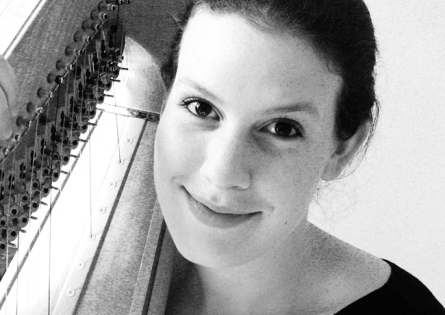
Biography
Robin Best, a native of Ottawa, Ontario, has been playing the harp for 15 years. Her studies began on the celtic harp with Mary Muckle in Ottawa, and continued with the pedal harp beginning in 2001. Orchestrally, Robin has performed with the Montreal, Quebec, Ottawa, Gatineau, Longueuil and Drummondville Symphony Orchestras, I Musici de Montreal, La Sinfonia de Lanaudière, The Banff Centre Opera Orchestra, all the ensembles of McGill University, and has twice been a member of the National Youth Orchestra of Canada. Robin holds a Bachelor of Music degree in Harp Performance and an Artist Diploma from the Schulich School of Music at McGill University, where she studied with Montreal Symphony principal harpist Jennifer Swartz, and studied for one semester at the Glenn Gould School with Judy Loman. She also holds a Performer Diploma from the Jacobs School of Music at Indiana University, where she studied with Distinguished Professor Susann McDonald.
Robin is now based in Montreal and Ottawa, where she is making her career as an orchestral, chamber and solo performer, as well as maintaining a private studio of harp students.
Florence Blain Mbaye
Marie Brassard

Biography
Marie Brassard is an actress, director and author. In 2001, after working in close collaboration with Robert Lepage for fifteen years in the theater and in films, she created her first solo show, Jimmy, as part of the Festival de théâtre des Amériques (now FTA). The success of this work prompted her to start her own production company, Infrarouge and to begin a solo career. Since then, in collaboration with guest artists from different disciplines and origins, she has created surreal theatre with virtuoso acting skills and innovative video, light and sound installations.
After Jimmy, there was The Darkness (2003), Peepshow (2005), The Glass Eye (2007), The Invisible (2008), Me talking to Myself in the Future (2010) and Trieste (2013), pieces in which she continues her technological experiments, exploring the possible ways to use sound and light in the theater. Her pieces, performed in French or English have been presented and acclaimed in many countries in the Americas, Europe and in Australia, among other cities in Paris, Brussel, London, Dublin and Berlin, in Vienna, Lisbon and Madrid, in Milan, Oslo and Stockholm, New York and Mexico, Sydney and Melbourne, in places as Le Théâtre de l’Odéon in Paris, the Barbican Center in London (PIT), the Haus der Berliner Festspiele and the Sophiensaele in Berlin, the Halle G im Museums Quartier and the Brut im Künstlerhaus in Vienna and the Kulturhuset in Stockholm and at The Studio of the Sydney Opera in Sydney and the Malthouse, Merlyn Theatre in Melbourne.
In 2013, at Sophie Cadieux' invitation she made a collage of texts of the quebecois author Nelly Arcan, that she directed with a cast of six actresses and a dancer, titled The Fury of my Thoughts. The piece, a major success originally produced and created at ESPACE GO, was re-created by Infrarouge in Spring 2017 and presented in front of full houses in Ottawa (CNA), Québec (Carrefour international-Grand Théâtre de Québec) and Montréal (FTA-Usine C). In April 2018, the play was programmed in Madrid, at the famous Teatro Espanol, and in autumn 2018, it was part of the Festival des Francophonies en Limousin in Limoges and was then shown in Amsterdam, at the Stadsschouwburg (ITA-Rabozaal).
Marie Brassard then directed this show in its Japanese version in Tokyo. Produced in collaboration with PARCO, this play, which premiered at the Galaxy Theater on November 4, 2017, ran there for three weeks, then went on tour to Hiroshima, Kitakyushu, Kyoto and Toyohashi.
Marie Brassard is currently developing a new solo work that will be declined in two steps. The first segment of the projet, titled Introduction to Violence, will be created in company of artists Antonin Sorel, Alexander MacSween, Pascal Grandmaison, Mikko Hynninen and Sabrina Ratté. It will open in Spring 2019, at Montreal Usine C. Initiated in 2016 while in residency at the Montevideo Centre in Marseille, the work officially started in Sweden Göteborg, in August 2018, in the context of a creation residency at the Vitlycke Centre for Performing Arts, commissioned by the Göteborg Dance and Theatre Festival.
In recent years, Marie Brassard has also been involved as a director and dramaturg in dance. She has created two shows in collaboration with choreographer and performer Sarah Williams, Moving in this World (2014), that was presented in Montreal, Potsdam and Madrid, States of Transe (2013), creation in situ at the Darling Foundry, and choreographed a solo for she in the triptych Here is always somewhere else (2010). She also worked with dancer and choreographer Anne Plamondon on her solo The same Eyes (2012), presented in Montreal and on tour in Quebec and also acted as director for Mécaniques Noctures (2017). She danced for Isabelle Van Grimde (Perspective Montréal et Le corps en question), acted as artistic advisor for Dana Gingras and Animals of Distinction (Another) and collaborated in different ways and to different degrees with choreographers Anne Thériault, Annik Hamel , Jane Mappin, and Karine Denault.
She also plays occasionally in films. She has appeared in films by directors Robert Lepage, Michael Winterbottom, Ryan McKenna, Denis Côté, Sophie Deraspe, Erik Canuel, Guy Maddin, Matthew Rankin and Stéphane Lafleur, among others.
In 2016, she was awarded the Ordre des arts et des lettres du Québec, an honorary distinction highlighting her exceptional contribution to the Quebec artistic community.
Jean-François Daignault
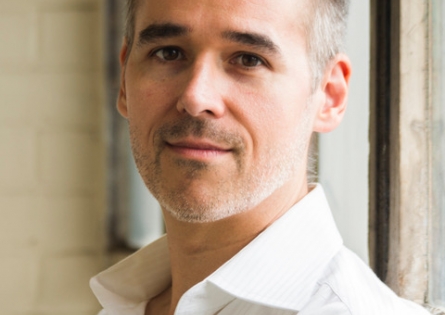
Biography
After studying the oboe and theatre, Jean-François Daignault earned a bachelor’s degree with honors in early music literature and performance from McGill University, with high distinction in voice.
Mr Daignault has for many years specialized in early music, with some incursions into the world of contemporary music. He has performed in North America and Europe with ensembles including Opéra de Montréal chorus, Orchestre Symphonique de Montréal chorus and Chants Libres, under the direction of conductors such as Hervé Niquet, Yannick Nézet-Séguin and John Rutter.
He has sung the famous « roasted swan solo » from Orff’s Carmina burana more than 20 times, including at the Festival de Lanaudière and at the Maison Symphonique de Montréal.
He is the cofounder of Ensemble ALKEMIA, a vocal trio that explores a capella repertoire from the last millenium. He sings and plays wind instruments with Ensemble séfarade et méditerranéen, which was awarded an Opus prize for their first album.
Mr Daignault also composes and arranges music. His works are performed regularly by local ensembles. He also enjoys exploring Montréal’s underground art scene, where he has put together performances which explore phantasy, transformation and the voice.
Charles-Éric Fontaine
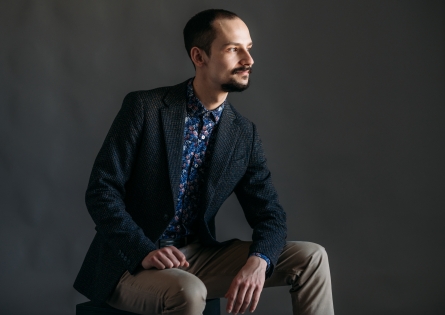
Biography
Montreal native Charles-Eric Fontaine is a conductor and oboist born in 1996, with a passion for contemporary music and composer-performer collaboration. His detailed attention to nuance in the score and devotion to collaborating musicians leads to vivid and intimate performances. He obtained his Master’s degree in conducting at McGill University in 2021 and learned alongside Alain Cazes, Guillaume Bourgogne, Lorraine Vaillancourt and Sandro Gorli. In March 2022, he was conducting Divertimento Ensemble and recording a CD released by Stradivarius. In 2023, he will make his conducting debut with the Nouvel Ensemble Moderne. The young conductor aspires to showcase the great works of the canon, while supporting the leading composers of the next generations.
Cristian Gort
Biography
Cristian Gort was Music Director of the Orchestre symphonique de l’Isle (2004-19), of the contemporary music ensembles Les Enfants Terribles (2004-07) and La Machine (2011-14), as well as guest professor of the contemporary music workshops, both at University of Montreal and McGill University (CME). Currently, he is Principal Conductor and Musical Advisor of the Société de musique contemporaine du Québec and Music Director of the Musica Viva Vocal Ensemble. His marked interest for 20th and 21st century music has led him to collaborate in the creation of numerous works: symphonic music, operas, chamber and choral music, in Europe, Asia and South America. In 2016, on his fifth collaboration with Chants Libres, he conducted the premiere of a new opera, The Trials of Patricia Isasa, by Kristin Norderval, which was awarded two Opus Prizes for Concert of the Year- Montreal and Concert of the Year – Modern, Contemporary Music. Among his other achievements, he conducted the premieres of the musical theatre psychodrama La Faim Artaud by Analia Llugdar and the opera-performance Perdre pied by Jimmie LeBlanc, the North American and Montréal premieres of two major works by Fausto Romitelli, An Index of Metals ([iks]) and Professor Bad Trip (La Machine), as well as the premiere of the opera L’Hypothèse de Caïn by composer Michel Gonneville and librettist Alain Fournier.
Léo Guiollot
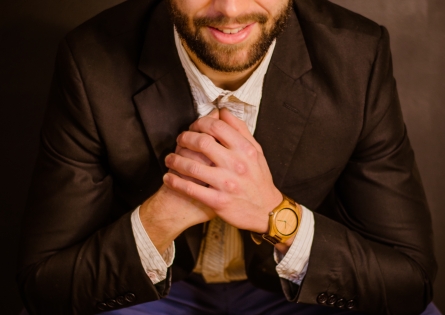
L'écoute du perdu - an opera by Keiko Devaux
L'écoute du perdu - an opera by Keiko Devaux
Biography
Léo Guiollot holds a master's degree in classical percussion from the Université de Montréal and a 5ème cycle degree from the Conservatoire de Musique de Montréal. He is increasingly active on classical and contemporary Quebec scenes, having recently worked with the Orchestre des Grands Ballets Canadiens, Orchestres symphoniques de Québec, Sherbrooke, Laval, Trois-Rivières, OM, the Toronto Messiaen Ensemble, SMCQ, Ensemble Caprice, Paramirabo, etc.
Founder and director of Movimento, a Brazilian percussion ensemble socially engaged, and more recently director of Kumpa’nia, a percussion ensemble, Léo also has a particular interest in 'world percussion'. He traveled to Cuba, Brazil and Spain to learn and experience traditional styles. His talent for interpretation and his involvement in the community have earned him various distinctions, notably the Lieutenant Governor's Youth Medal and a handful of academic and travel scholarships.
Jeremy Huw Williams
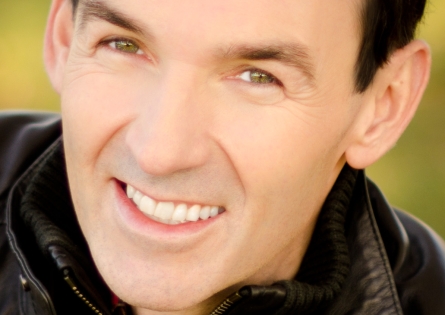
Biography
The Welsh baritone Jeremy Huw Williams studied at St John's College, Cambridge, at the National Opera Studio in London, and with April Cantelo. He made his debut with Welsh National Opera as Guglielmo (Così fan tutte) and has since appeared in seventy operatic roles. He has given performances at major venues in North and South America, Australia, China, India, and most European countries.
In France he has sung the roles of Olivier (Capriccio), Papageno (Die Zauberflöte), George (Of Mice and Men), Guglielmo (Così fan tutte), Shchelkalov (Boris Godunov), Baritone (Hydrogen Jukebox) and title role Till Eulenspiegel by Karetnikov for L'Opéra de Nantes, and Sebastian (The Tempest) for L’Opéra du Rhin. In Italy he has sung the role of Nixon (Nixon in China) at the opera house in Verona and Ferryman (Curlew River) at the opera houses of Pisa and Trento. In Greece he has sung the role of Chou En-lai (Nixon in China) for Greek National Opera. In Belgium he has sung the role of Marcello (La Bohème) for Zomeropera. In Norway he has sung the role of Papageno (Die Zauberflöte) for Vest Norges Opera and Serezha (The Electrification of the Soviet Union) for Opera Vest. In Austria he has sung the role of Dr Pangloss (Candide) in Vienna, a role that he repeated in Bremen, Munich, Leipzig, Suhl and London. In the USA he has sung the role of Lukash (The Good Soldier Schweik) for Long Beach Opera.
In Wales he has sung the roles of Guglielmo (Così fan tutte), Escamillo (Carmen), Germont (La Traviata), Marcello (La Bohème) and Le Dancaïre (Carmen) for Welsh National Opera and the roles of Serezha (The Electrification of the Soviet Union), Tarquinius (The Rape of Lucretia), Choregos (Punch and Judy), Mangus (The Knot Garden) and Dr Simon Browne (For You) for Music Theatre Wales. In Ireland he has sung the role of Teddy (The Silver Tassie) for Opera Ireland. In Scotland he has sung the roles of Andrew (74 Degrees North), Father (Zen Story), Epstein (The Letter) and Kommerzienrat (Intermezzo) for Scottish Opera.
He has given recitals at the Wigmore Hall and Purcell Room, and at many major music festivals. He has appeared with the BBC National Orchestra of Wales in Tippett’s King Priam at the Royal Festival Hall, the City of Birmingham Symphony Orchestra in Lambert’s Summer’s Last Will and Testament at Symphony Hall, the Hallé in Handel’s Messiah at the Bridgewater Hall, the Philharmonia in Mozart’s Requiem at St David’s Hall, the BBC Symphony Orchestra in Nielsen’s Third Symphony at the Royal Albert Hall during the BBC Proms, the Royal Liverpool Philharmonic Orchestra in Rawsthorne's Medieval Diptych, the BBC Scottish Symphony Orchestra in Adams’s The Wound Dresser at City Halls, the BBC Philharmonic in Schubert’s Mass in Ab, the Royal Philharmonic Orchestra in Beethoven’s Ninth Symphony, the London Philharmonic Orchestra in Watson’s O! Captain, the Ulster Orchestra in McDowall's Theatre of Tango, the Bournemouth Symphony Orchestra in Mathias’s This Worlde’s Joie at the Three Choirs Festival, and the BBC Concert Orchestra in Stainer’s Crucifixion at Southwark Cathedral for BBC Radio 2.
He has also appeared with the RTE Concert Orchestra in Dvořák's Requiem at the National Concert Hall in Dublin, the Orchestre National de Lyon in Benjamin's Sometime Voices at the Auditorium de Lyon, l’Orchestre Léonard de Vinci in Brahms’s Requiem at the opera house in Rouen, the Orquestra Simfònica de Barcelona i Nacional de Catalunya in Orff’s Carmina Burana at the Auditori in Barcelona, and the Sønderjyllands Symfoniorkester in Bach’s Weinachts-Oratorium.
He is renowned as a fine exponent of contemporary music and has commissioned much new music. He frequently records for BBC Radio 3 (in recital, and with the BBC NOW, CBSO, BBC SO, BBC SSO, BBC Philharmonic and BBC CO), and has made fifty commercial recordings, including twenty solo discs of songs.
As a principal singer with Welsh National Opera he appeared at the opening night of the Wales Millennium Centre, and received the inaugural Sir Geraint Evans Award from the Welsh Music Guild, given annually to a person or persons who have made a significant contribution to Welsh music in any one year or recent years: ‘there has been an unanimous decision that the first award should be made to baritone Jeremy Huw Williams in recognition of not only his performing ability but also for the tremendous support that he has given to Welsh composers and their music in recent years’.
He was awarded an Honorary Fellowship by Glyndŵr University in 2009 for services to music in Wales, the Honorary Degree of Doctor of Music from the University of Aberdeen in 2011, the Medal of the Order of the British Empire in the 2021 Queen’s Birthday Honours, and the 2022 John Edwards Memorial Award, the most prestigious non-competitive award given in Wales for services to the nation’s music.
Raphael Laden-Guindon
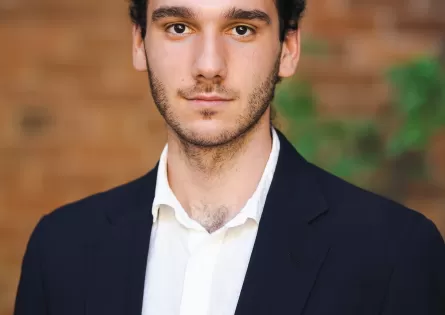
Biography
Praised for his “contagious sensibility” (Revue l’Opéra), Canadian-American Baritone, Raphaël Laden-Guindon will be heard next as the baritone soloist in Keiko Devaux's new opera: L'écoute du perdu in a co-production of Musique 3 Femmes and Ensemble Paramaribo. He recently completed a Graduate Diploma in Performance at McGill University, where he performed the title role in Don Giovanni with Opera McGill. He made his professional debut at the 2020 Festival de Musique de Lachine, as a part of the concert entitled “Spotlight on the New Generation." Recent credits include Ophémon in L’amant anonyme (Chevalier de St-Georges), Bob in The Old Maid and the Thief (Menotti), Mr. Olsen in Street Scene (Weil), and Publio (cover) in La Clemenza di Tito (Mozart) with Opera McGill; Aristeo in Orfeo (Rossi), Corebo in La Didone (Cavalli) and Aristone in Xerse (Cavalli) with the Yale Baroque Opera Project. Raphaël holds a Master's degree from McGill University during which he was a recipient of both SSHRC and FRQSC master’s research grants. Outside of opera, he is a cofounder of Puntalytics, the world’s foremost open source hub for NFL punting analytics.
Laurence Latreille-Gagné

Biography
Soloist, improviser, chamber and orchestra musician, Laurence Latreille-Gagné completed her studies in both Quebec, graduating with distinctions in horn and chamber music at the Conservatoire de musique de Montréal, and in Germany at the Musikhochschule Stuttgart.
Recipient of various academic scholarships and several first prizes in solo and chamber music competitions, her thirst for challenges and new knowledge has led her to continue perfecting her playing by participating in many master classes and training courses such as the National Arts Centre, Orford Centre for the Arts, Domaine Forget and the International Ensemble Modern Academy in Austria. She has also gained experience playing in various orchestras and festivals including the National Youth Orchestra of Canada and the National Academy Orchestra. Since 2007, she also distinguished herself playing as a soloist with the Symphony Orchestra and Wind Ensemble of the Montreal Conservatory of Music, as well as playing Robert Schumann’s Konzertstück for four horns twice as principal horn.
Laurence stands out for her curiosity, her commitment and her great versatility. She is very active as a chamber musician in Montreal (being a member of Choros wind quintet, Ensemble Magnitude6 and Débonnaire Trio), performs regularly with several of the bests chamber ensembles and orchestras across Quebec, and is a passionate teacher. She is very involved in the field of contemporary music, worked for the Montreal Contemporary Music Lab and Codes d’Accès, as well as regularly participating in the creation of new works as a member of the Ensemble Contemporain de Montreal and the Ensemble Magnitude6.
Jean-Michaël Lavoie

Biography
Since the age of 28, Jean-Michaël Lavoie enjoys an international career as a guest conductor and performed in more than 40 music capitals, among them Salzburg, Berlin, Vienna, Paris, Cologne, New York, Los Angeles, Prague, Milan, Venice.
After his studies in Montreal, he is appointed Assistant Conductor to the Ensemble intercontemporain (2008-2010) and one of the Resident Conductor of the Los Angeles Philharmonic as part of the Dudamel Conducting Fellow program (2010). He deepens his musical training with Pierre Boulez (Ensemble intercontemporain, Lucerne Festival Academy) and Susanna Mälkki (Ensemble intercontemporain, Los Angeles Philharmonic) and Esa-Pekka Salonen (Orchestre de Paris).
Since 2010, he is guest conductor to the following orchestras : Los Angeles Philharmonic, BBC National Orchestra of Wales, Orchestre philharmonique de Radio France, WDR Sinfonieorchester Köln, SWR Sinfonieorchester Baden-Baden und Freiburg, Orchestre philharmonique du Luxembourg, Deutsche Radio Philharmonie, Prague Radio Symphony Orchestra, Orchestre national de Bordeaux Aquitaine, Orchestre philharmonique de Strasbourg, Orchestra national de Lille, Orquestra Sinfónica do Porto Casa da Música, NFM Filharmonia Wroclawska, Aarhus Symphony Orchestra, Orchestre Métropolitain, Edmonton Symphony Orchestra, Victoria Symphony.
He made his opera debuts at Teatro alla Scala, Milan, co-conducting with Susanna Mälkki the world premiere of Luca Francesconi’s Quartett, at Opéra de Lyon and Opéra national de Bordeaux and is a regular guest to the specialized ensembles in contemporary music : Ensemble intercontemporain, Klangforum Wien, Ensemble Modern, Musikfabrik, Ensemble Resonanz, Ensemble L’Itinéraire, Ensemble Multilatérale, Israel Contemporary Players.
Winner of the Prix Opus 2010 New Artist of the Year, he recorded two piano recitals for La chaîne culturelle de Radio-Canada’s program Les Jeunes Artistes. In 2017, he was appointed Professeur adjoint at Faculty of music of Université de Montréal. In July 2020, he is appointed Music Director Associate of Ensemble Ars Nova (France) for the next three years.
During the 2020-21 season, Jean-Michaël Lavoie makes his debut at the Wiener Staatsballett – Volksoper Wien and returns conducting the SMCQ Ensemble at the Maison Symphonique de Montréal for the 10th edition of the Montreal New Musics Festival.
Charlotte Layec
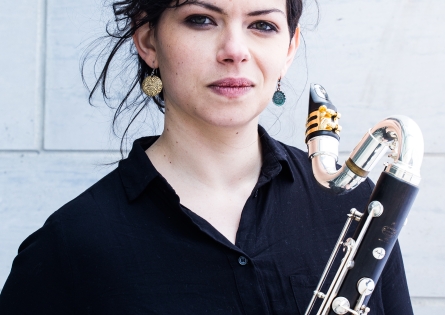
L'écoute du perdu - an opera by Keiko Devaux
L'écoute du perdu - an opera by Keiko Devaux
Biography
Clarinetist of French nationality established in Montreal, Charlotte Layec evolves around different musical aesthetics combining classical music and contemporary music, and mixte music and free improvisation. Attracted by creation and new music, this musician regularly collaborates with different composers on works as soloist or in chamber music. She is particularly interested in the co-creation process inherent in the collaboration between a composer and an interpreter in electroacoustic music.
A committed and active artist on the Montreal music scene, Charlotte Layec is a founding member of several ensembles including the Trio Émerillon, the Ensemble ILÉA, the Collectif Bakarlari and the TESSE Ensemble. The clarinetist has performed in several international events and festivals including NYCEMF (USA), ClarinetFest (USA), Re-Flux (CA), Mise-En-Place (USA), FIMU (FR), Sonic Circuits Festival (USA) , TIES (CA) and Mutek (CA).
Frédéric Le Bel
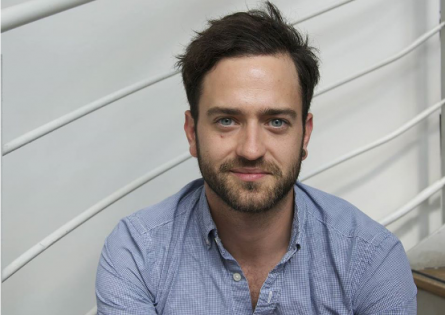
Biography
Frédéric Le Bel graduated in 2011 at the University of Montreal where he studied composition with Philippe Leroux. In 2013, he completed a master’s degree from the Conservatory of Music in Montreal under the supervision of Serge Provost. From 2014 to 2019, he attended both Ircam's cursus and obtained a PhD degree from the same institution for working on the development and the integration of ‘smart’ algorithms by and for sound design and music composition. Frédéric has also participated in several international academies such as the Impuls Academy in Austria and the ManiFeste Academy in France. His music has been awarded several times in Canada and has been performed in various international festivals such as the New Music Darmstadt in Germany, the Matera Intermedia in Italy and the Cluster New Music + Integrated Arts in Canada to name a few. His repertoire explores instrumental, acousmatic and mixed music. From soloist to symphonic orchestra, he has worked with numerous recognised artists such as Ricardo Descalzo, the TANA String Quartet, the Divertimento Ensemble, the Klangforum Wien and the CMM Orchestra. For him, composing is a mix of research, creation and confusion. Finally, the expression by the sound phenomenon through an architecture bearer of knowledge and meaning remains his greatest artistic preoccupation.
Myriam Leblanc
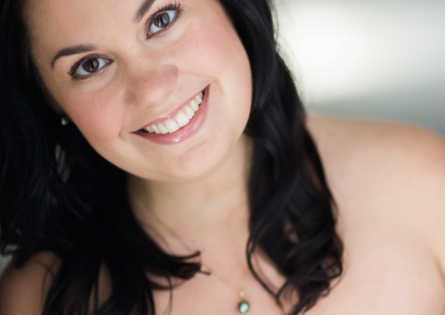
Biography
A graduate of McGill University, Myriam Leblanc obtained a master's degree in choral conducting direction from the University of Sherbrooke. She was a First Prize winner and People's choice Award winner at the Orchestre symphonique de Trois-Rivières Competition, a Jeune Ambassadrice Lyrique in 2014 (Prix Québec-Bavière), Audience Choice Award winner at the Canadian Opera Company Centre Stage Competition, Third Prize winner at the Ottawa Choral Society New Discoveries contest, holder of the Excellence grant given annually by l'Atelier lyrique de l'Opéra de Montréal, First Prize winner in the Mathieu-Duguay Early Music Competition at the 2017 Lamèque International Baroque Music Festival. She has been working in the world of music for few years. Leblanc is recognized for the purity of her tone, a flexible and warm voice and her mastery of both technique and musical expressiveness.
In 2016, she made her debut with the Opéra de Montréal in the role of the High Priestess in Verdi's Aida. La Presse music critic Caroline Rodgers described her voice as one of "rare beauty". Her more recent performances (2017-2018) include Milica in Sokolovic's Svadba with Opéra de Montréal, Micaela in Bizet's Carmen with Opéra de Québec and concerts with conductors such as Yannick Nézet-Séguin, Kent Nagano, Matthias Maute and Jonathan Cohen. In 2018-2019, she sang a Gilda in Verdi's Rigoletto, the soprano solos on Handel's Messiah with Ensemble Caprice, the Mendelssohn's Symphony No.2 "Lobgesang" with l'Orchestre Metropolitain under Yannick Nézet-Séguin's direction. Recently, she was a soloist with Les Violons du Roy under Jonathan Cohen's direction.
THIERRY PÉCOU

Biography
Thierry Pécou (1965) initially studied piano at the Conservatoire National de Région de Paris before he went to the Conservatoire National Supérieur de Musique (CNSM) to study orchestration and composition.
Very early in his career, he realised that he needed to find other sources of inspiration than avant-garde and post modernism to be able to realise his dream ‘of making the whole world resonate’. He started looking for a way to restore music to its dimension as ritual, by visiting cultures whose traditions are as remote from the aesthetic history of the Western world as possible. Thierry believes that when music is conceived as a ritual, it will be able to captivate and absorb the listener. During his encounter with Afro-American cults such as the Brazilian candomblé or Amerindian shamanic rituals, he found out that one of the key ingredients to establish that ritualistic dimension is to make the music inseparable from body movement. It does not necessarily needs to be a carefully choreographed dance, simply a gesture or the body language of an instrumentalist will inevitably contribute to the exchange of energy between musicians and audience.
When listening closely to Thierry’s work, one can actually follow his never-ending quest around the globe: the languages and imaginative world of pre-Columbian America and Amerindian societies (Symphonie du Jaguar and the cantata Passeurs d’eau), the traces of Africa and America (like in Tremendum, Outre-Mémoire and L’Oiseau innumerable), influences of ancient Chinese and Tibetan culture, or Greek mythology. In his most recent works, the native North-American people — especially the Navajo and their healing rituals — are a strong source of inspiration. The characteristic chants and drums of their ceremonies are they key element of his concerto for trumpet and orchestra Soleil rouge. In his concert-rituel The Beauty way, Thierry Pécou pays tribute to the Navajo’s healing rituals.
But Thierry does more than translating his passionate theory into musical notes: he is one of the few composers who actually performs himself. Solo, with his own works at the piano, in chamber ensembles, or as soloist with orchestra in his piano concertos. By performing live, he puts his ideas to the test directly. The interaction with the audience provides him with the experience he can use in his strive to find the perfect music that will indeed facilitate the perfect ritualistic performance. In 2009 he decided to found the Ensemble Variances to constitute a platform for encounters between contemporary creation and music of other traditions.
Apart from the main source of musical inspiration, his travels also led to a profound engagement with people and the cultures that fell victim to Western expansion, although strictly from a humane and historical perspective rather than political. In several of his works he gives a voice to those who suffered from the colonial era: Ñawpa tells the tale of the destruction inflicted on the ritual music of the ancient Andean civilisation of Tawantinsuyu, and Outre-Mémoire revives the forbidden memory of the victims of the slave trade.
Although being inspired by old and mainly oral traditions, his music is far from simple. One should realise though that for Thierry Pécou, complexity should never be the aim of an art; it simply results from listening to the world. To him, writing is finding oneself face to face with the Other, whoever or whatever that may be. Yet the musical form as well as its reception cannot be forced into a system or be reduced to the expression of an ideology, and a well-placed silence can say more than a million notes.
His refreshing musical vision granted him a scholarship at the Casa de Velázquez in Madrid, was rewarded with the Prix Villa-Médicis Hors les Murs and resulted in many more prizes and commissions from leading institutions and performers. Just to mention a few: in 2016, he reveived the Grand Prix de la musique symphonique (carrière) de la Sacem, in 2010 the Académie des Beaux-Arts awarded him the Grand Prix de Composition Musicale of the Fondation Simone et Cino del Duca, he received the prize for best new music premiere 2010 from the Syndicat de la Critique Théâtre, Musique et Danse (French Critics’ Circle), and the recording of his Symphonie du Jaguar was distinguished by the Grand Prix 2010 of the Académie Charles Cros and received a Diapason d’Or in 2010.
Thierry has been artist in residence regularly, from venues and institutions in his home country France to Russia (1994-1995) and Canada, where the Banff Centre of the Arts invited him back more than once between 1989 and 1997.
His works are performed and recorded by world class soloists, ensembles and orchestras (Alexandre Tharaud, Hakan Hardenberger, François Leleux, Kronos Quartet, Quatuor Debussy, BBC Symphony Orchestra, Orchestre Philharmonique de Radio France, Orchestre National de France) at festivals and venues all over the world: Festival Présences at Radio France, Umeå Opera in Sweden, Gaudeamus Music Week in Amsterdam, the Moscow Autumn Festival, New Music Concerts in Toronto, the Foro Internacional de Música Nueva in Mexico City, Automne en Normandie and the Ambronay Festival in France, the Bath International Music Festival in the UK, the Tampere Choir Festival in Finland, the Shanghai Spring Music Festival in China, the Tokyo Opera City Concert Hall and Izumi Hall Osaka in Japan, the Wigmore Hall in London, the Elbphilharmonie in Hamburg, the Arsenal de Metz, the Opéra de Rouen Normandie, and the Salle Pleyel, Théâtre de la Ville and Théâtre des Champs-Élysées in Paris.
- Anne van der Heiden
Frédéricka Petit-Homme
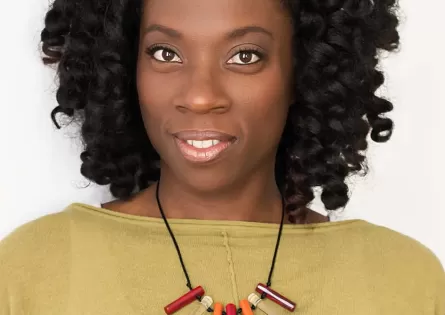
Biography
Montréal-born soprano, Frédéricka Petit-Homme is celebrated for the warmth and strength of her full tone. She has distinguished herself as a dynamic and engaging performer in roles such as Annie in Gershwin’s Porgy and Bess (Opéra de Montréal), the Third Witness in L’Archange (Chants Libres), the Nurse in Concordia’s Rise Pandemic Opera, Marian Anderson in Backstage at Carnegie Hall (Black Theatre Workshop), and Aida in Parisa Sabet’s Vanishing Point.
Her musical prowess and collaborative spirit have provided her with opportunities to perform with the city’s premier ensembles, notably l’Orchestre symphonique de Montréal, Les Grands Ballets Canadiens de Montréal, and l’Opéra de Montréal under renowned conductors including Paul McCreesh, Hervé Niquet, Wayne Marshall, and Kent Nagano.
Frédéricka holds a Bachelor of Music degree in vocal performance and a Master of Music degree in conducting both from the Schulich School of Music of McGill University. She is currently pursuing a doctorate in Music Education at McGill University and is the new host for Choral Concert on CBC Music.
Miss Petit-Homme is scheduled to perform with the Phoenix Chamber Choir in May. She will also participate in Bradyworks’ full production of Backstage at Carnegie Hall in the Fall of 2022 and Keiko Devaux’s L’Écoute du perdu in 2023.
Vincent Ranallo

Catherine St-Arnaud

Biography
Praised for her colourful performances, Canadian soprano Catherine St-Arnaud is a promising young lyrical artist. Ms St-Arnaud received the First Prize in the voice category of the prestigious Prix d’Europe, was awarded Third Prize in the voice category of the Montreal Symphony Orchestra Manulife Competition and was a Metropolitan Opera National Council Auditions regional finalist (New England). She has also been named a Jeune Ambassadeur Lyrique by the L20 Theater, who awarded her the Québec-Bavière Prize.
Catherine’s versatile, luminous and warm timbre transposes itself beautifully in both baroque repertoire as well as opera. In 2019, she made her debuts with Orchestre Métropolitain and with Kosice Philharmonic Orchestra in Slovakia. We also heard her as a soloist with Les Idées Heureuses, Clavecin en Concert, the Studio de musique ancienne de Montréal, the Montreal Bach Festival, the Montreal Baroque Festival, the Société d’Art Vocal, and the Arte Musica Foundation.
During season 2019-2020, Catherine sung the role of Susanna in Le nozze di Figaro at the Quebec Opera Festival, show which went on a Canadian tour with Jeunesses Musicales du Canada. In October 2020, she sung the role of Lucia in Lucia di Lamermoor in a Jeunesses Musicales production, which should also have been presented at the Quebec Opera Festival and gone on a Canadian tour.
Catherine has many ongoing projects, please visit her website for some future announcements.
Jennifer Szeto
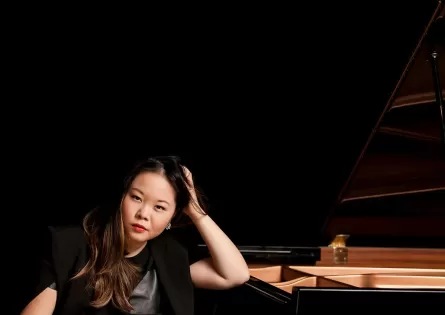
Biography
Praised for “an immense sweetness and precision which seemed to be flawless” (L’Opéra) and an “amazing versatility” (Opera Ramblings), Jennifer Szeto carves a dynamic path as a performer, producer, and administrator. She is a graduate of San Francisco Opera’s Adler Fellowship, Merola Opera Program, Canadian Opera Company Ensemble Studio, and L’Atelier Lyrique de l’Opéra de Montréal. A sought-after collaborator for contemporary creations, Jennifer is Founding Artistic Director of Musique 3 Femmes, which commissions and develops operas by emerging female composers and librettists with a biennial $50,000 award - the Mécénat Musica Prix 3 Femmes. Highlights include INCONNU for UfaFabrik (Berlin); TRIPTYQUE in collaboration with La société de musique contemporaine du Québec; and Laurence Jobidon’s L’hiver attend beaucoup de moi for Opéra de Montreal, described described by the Montreal Theatre Hub as “exactly what opera needs.. bold, contemporary, poetic, political, feminist, theatrical, well-executed, and not afraid of traditionalists…” In 2023, Jennifer leads the world premiere of L’Écoute du perdu by Keiko Devaux in co-production with Paramirabo and Le Vivier, with stage direction by Marie Brassard. For Opéra de Montréal, she serves as music staff for the Canadian premiere of Golijov’s Ainadamar.
A passionate administrator, Jennifer worked with Tapestry Opera to develop a new Canadian Opera Resource database (COR), as well as the Women in Musical Leadership Program, a fellowship for female and non-binary conductors in partnership with the Toronto Symphony Orchestra and Pacific Opera Victoria. A noted panelist for conversations around creation, young artist training, and entrepreneurship, Jennifer is on the musical staff of Opera McGill and a faculty member at Sewanee Music Centre’s OperaFest. She sits on the Board of Directors of the Association for Opera in Canada. Jennifer holds degrees from McGill University and University of Toronto.
Aysel Taghi-Zada
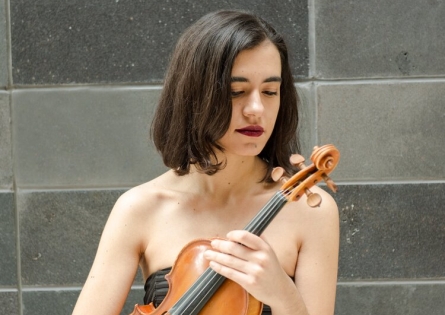
Biography
Aysel Taghi-Zada is a passionate violinist devoted to the performance of classical and contemporary music. She has collaborated with some of the most distinguished composers and musicians from North America and Europe such as Philip Glass, Brian Current, Salvatore Sciarrino, Chris Paul Harman, Kevin Lau, Mark Fewer, Pierre Leroux, David Geringas and Pascale Beaudin. She is frequently invited to perform with contemporary ensembles such as Tapestry Opera, New Music Concerts, Freesound Ensemble, Thin Edge New Music Collective and Soundstreams Canada, and she recently participated in Continuum Contemporary Music’s Hatch Summer Performance program as an emerging artist.
She is also a founding member of the Vaso String Quartet, which performs around North America and participated in the 2019 Scotia Festival of Music in Halifax. As a recording artist, she can be heard on Jason Doell’s 2018 album … Amid the Cannon’s Roar, Catherine Daniel’s Sacred Christmas, and the Marrieds’ Fire in the Flame.
She was invited to be a Guest Concertmaster for the Georgian Bay Symphony in 2018 and 2019, and a Guest Assistant Concertmaster for the Kingston Symphony Orchestra in 2019. She has performed with several orchestras, including the Toronto Symphony Orchestra, Canadian Opera Company, Windsor Symphony, Thunder Bay Symphony Orchestra, Kitchener-Waterloo Symphony Orchestra and Toronto Concert Orchestra.
In 2019, Aysel participated in a residency at Lunenburg Academy of Music Performance, where she worked with Gidon Kremer. She is a graduate of the Artist Diploma Program at the Glenn Gould School where she studied with Barry Shiffman. While studying at McGill University with Jonathan Crow, she co-founded Ensemble Paramirabo, a group that specializes in showcasing music written by Canadian composers, and she performed on their first album Autoportrait. She is currently a violin instructor with the Columbus Cultural Centre, where her studio includes students of all ages, and she was a mentor with the Waterloo Region Contemporary Music Sessions in 2018 and the Toronto Creative Music Lab in 2019.
Pierre Vachon
Lorraine Vaillancourt

Biography
A conductor and pianist, born in 1947, Lorraine Vaillancourt is the founder and Music Director of the Nouvel Ensemble Moderne (NEM), the ensemble-in-residence at the Université de Montréal’s Faculty of Music since 1989. A full professor at this same school since 1990, she led its Contemporary Music Workshop from 1974 until retiring from teaching in 2016.
Vaillancourt is regularly invited by different ensembles and orchestras, both at home and abroad. In Canada, she has conducted the Orchestre Symphonique de Montréal, the Orchestre Symphonique de Québec and the Orchestre Métropolitain; overseas, she has led the Orchestre de Cannes, the Gulbenkian Orchestra (Lisbon), the RAI National Symphony Orchestra (Turin), the Orchestre Philharmonique de Nice, the Ensemble Orchestral Contemporain (Lyon), the Ensemble Sillages (Brest, France), the Plural Ensemble (Madrid), and Les Percussions de Strasbourg. Vaillancourt is a founding member, along with composers José Evangelista, John Rea and Claude Vivier, of the Montreal concert society Les Événements du Neuf (1978 to 1989). In 1990, she was the driving force behind the creation of Circuit, a North American journal dedicated to 20th-century music. She was the president of the Conseil Québécois de la Musique (CQM) from 1998 to 2001 and subsequently sat on the board of directors of the Conseil des Arts et des Lettres du Québec (CALQ) until 2006.
Vaillancourt is also a member of the Royal Society of Canada and the Ordre du Bleuet. The recipient of an honorary doctorate from Université Laval in Quebec City in June 2013, she was named a Member of the Order of Canada (C.M.) in February 2016, in recognition of her considerable contribution to contemporary music. That same year, she received the Homage Award at the Opus Awards ceremony, as well as the Prix Denise-Pelletier granted by the Government of Quebec in honour of her outstanding career in the performing arts. In 2018, Vaillancourt was named a Knight of the Order of Quebec and, in 2019, was awarded the Medal of the National Assembly of Quebec, a prestigious distinction recognizing her major contribution to Quebec’s cultural life.
